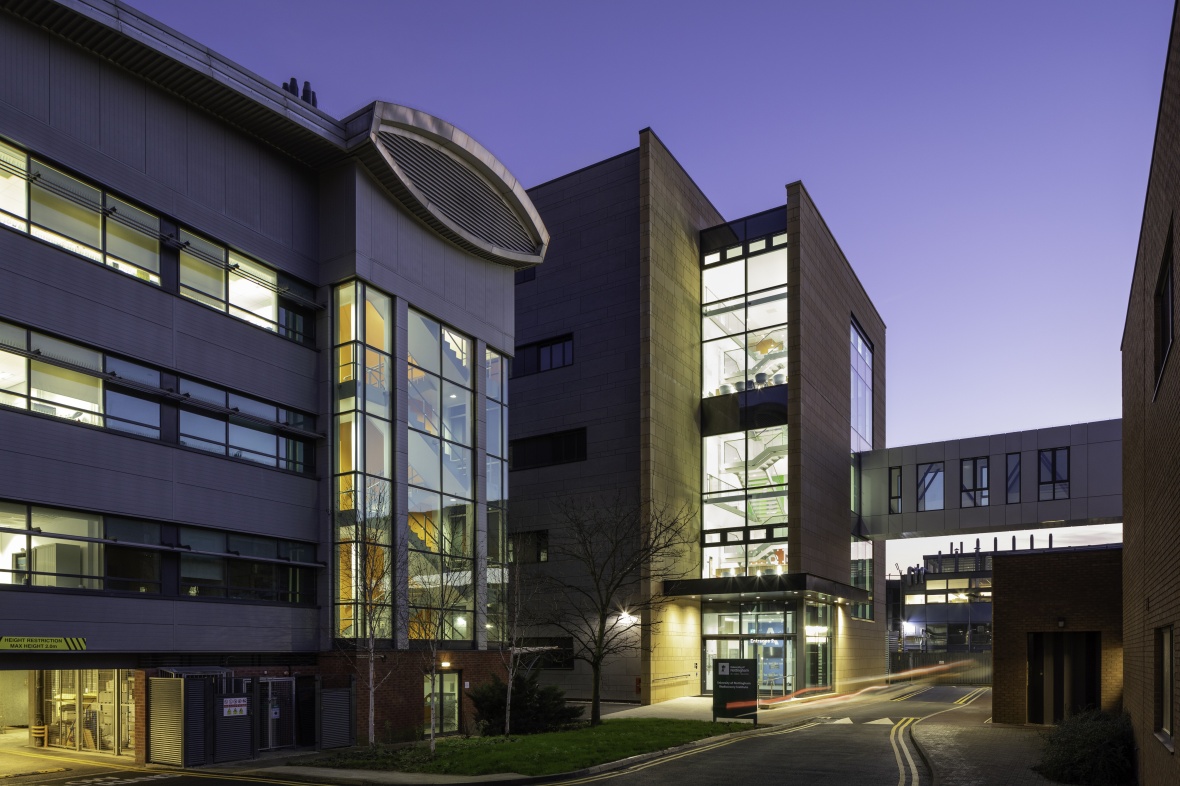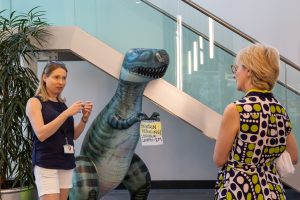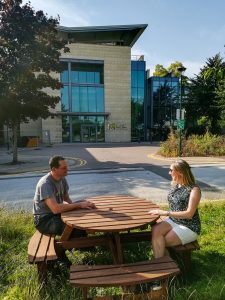
September 10, 2020, by Rob Ounsworth
It’s exciting to pull together and help make a difference in this pandemic
The Biodiscovery Institute’s Dr Ruth Griffin, one of the first researchers to return to the lab, reflects on her experiences as she continues vital work in developing vaccine platform technologies
Most vaccines are injected but our delivery systems are designed for administration via mucosal routes such as the mouth or nose to target the natural site of infection and trigger the best possible immune response. Our platforms are “plug and play” systems whereby you can swap in antigens from different infectious agents that you are immunising against.
One of our oral platforms is a probiotic spore which naturally survives the acidity of the stomach and germinates in the small intestine. We have genetically engineered the spore to present the desired antigens and stimulate strong antibody responses not only in the gut but in the bloodstream to cover all potential sites of infection including the respiratory tract. We are testing our spore vaccine against the gut bug, Clostridium difficile in animal models at the BSU and are making plans to next apply our technology to SARS-CoV-2 and TB.
The COVID-19 pandemic highlighted the desperate need for new vaccine delivery systems that can be readily applied to emerging pathogens and made rapidly available worldwide. Our spore platform meets all practical requirements: it is safe, produced at very low cost and is easy to administer with no need for needles and syringes. Unlike all other vaccines being developed to target SARS-CoV-2, our spores can be distributed without a refrigerated supply chain, not only reducing costs but importantly allowing our vaccine to reach rural communities in developing countries which lack refrigerators.

Ruth Griffin meets Professor Dame Jessica in the newly reopened Biodiscovery Institute. The University policy on on face coverings was not yet in force
I was strongly encouraged by Research and Innovation to submit a proposal applying our platforms to SARS-CoV-2. I was well out of my comfort zone but with my Senior Technician, Jaime Hughes, we worked together to write a proposal that was approved by the Research Triage Group, a panel of academics from across the University with expertise in vaccines, viruses and delivery systems who review proposals submitted on COVID research. The group’s decisions on green-lighting research projects also influenced which academics should return to work and the schedule for reopening of buildings.
This new drive to share resources, knowledge and, contacts
underlines that ‘the sum is greater than the parts’
and must be nurtured
It was exciting to pull together with academics from different schools and start working collaboratively with the common goal of making a difference in this pandemic. This new drive to share resources, knowledge and, contacts underlines that “the sum is greater than the parts” and must be nurtured from here on in.
A COVID mini conference was held in June with an exciting opportunity for 16 of us from across the University to give a three-minute presentation. It blew me away hearing about the initiatives of other academics tackling this global crisis from restoring the high street to managing mental health to developing new ways to diagnose infections. The wealth of strengths and ideas showcased led to strategic pairings of different groups for programme grants to be written.
With a Midlands Innovation and Commercialisation Research Accelerator award, preclinical studies are due to start shortly conducted by two of my PhD students, testing the efficacy of our spore platform against C. diff. Following proof of concept, I plan to file a patent on the technology, apply for large grants such as UKRI’s Developmental Pathway Funding Scheme for biomedical catalysts and make progress testing our platform against TB and SARS-CoV-2. This has been made possible by forming collaborations with academics from other universities with expertise in these diseases.
Lessons from lockdown
Microsoft Teams
Lockdown has been a challenge for all but there are positives to take away. Teams has become the effective new way of communicating not only for one-on-ones and small groups but for large meetings and even conferences. Delivering lectures live through Teams will become a key way forwards for hybrid teaching.
Stopping to read and write
Normally tearing oneself away from the lab to read and write is a challenge. I think my group saw the benefit of this time out and moving forwards, perhaps building in flexible reading weeks into PhD programmes for students could be worth considering.
Time for data analysis
Devising new dry lab projects for my MSc students gave the opportunity for proteomics data generated by my former PhD student to be analysed. Combining this with using bioinformatics freeware tools, allowed my project students to get their teeth into real research. All my students engaged really well proving that in silico projects can work! The temptation is often to generate more and more data but this experience has taught me that it pays to stop and take stock of the data you have and try and turn it into outputs.

Lab meeting: Ruth Griffin and Chris Denning swap ideas at the Bisdiscovery Institute’s popular picnic table, hopefully to be joined by nine more
Fun and friendships at work
As Environment Lead for the BDI Engagement Team, I proposed the sunflower competition to raise spirits and form a common non-work related goal. The idea caught the interest of the BDI Director Chris Denning and Engagement Lead, Alex Thompson, which led to a lot of interaction, activity and fun with tens of thousands of seeds distributed far and wide, even to the US.
My picnic table suggestion took off, with BDI staff donating generously. One table has now been erected thanks to Chris and is being well used. We would like nine more for socially distanced lab meetings so please keep donating via JustGiving. We welcome staff from all buildings to use these tables as we put more up.
The lockdown made me realise the importance of making more time for friendships at work. I took up invitations to join colleagues at the “Virtual Pub”, “Teams coffees” with a fun group of academics from the QMC and socially distanced power walks with Luisa Martinez-Pomares.
To sum up, moving forwards, let’s all strive to “work together well”!
Dr Ruth Griffin is an Assistant Professor in Microbial Pathogenesis in the School of Life Sciences and is based in the Synthetic Biology Research Centre, headed by Professor Nigel Minton
No comments yet, fill out a comment to be the first

Leave a Reply